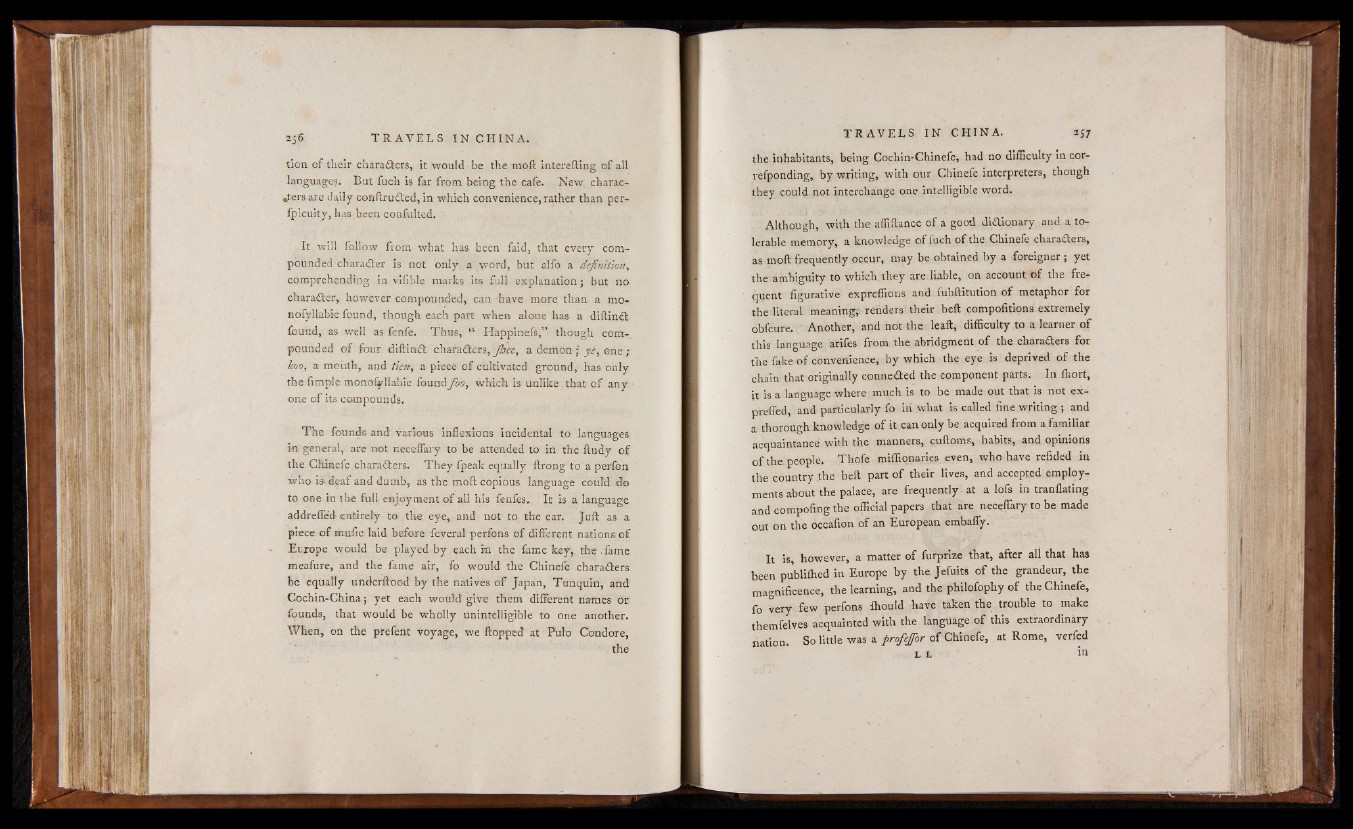
tion of their chara&ers, it would be the rnoft interefting o f all
languages. But fuch is far from being the cafe. New charac-
„tersare daily conftrufted, in which convenience, rather than per-
fpicuity, has been confulted.
It will follow from what has been faid, that every compounded
charaiter is not only a word, but alfo a definition,
comprehending in vifible marks its full explanation; but no
chara&er, however compounded, can have more than a mo-
nofyllabic found, though each part when alone has a diftin£t
found, as well as fenfe. Thus, “ Happinefs,” though com-,
pounded o f four diftirfot chara£ters, Jhce, a demon; ye, one ;
&oo, a mouth, and tien-, a piece o f cultivated ground, has only
the fimple monoiyllabic foundfo o , which is unlike that o f any
one o f its compounds.
The founds and various inflexions incidental to languages
in general, are not neceflary to be attended to in the ftudy o f
the Chinefe charaiters. They fpeak equally ftrong to a perfcn
who is deaf and dumb, as the moft copious language could do
to one in the full enjoyment o f all his fenfes. It is a language
addrefled- entirely to the eye, and not to the ear. Juft as a
piece o f mufic laid before feveral perfons o f different nations; o f
Europe would be played by each in the fame key, the .fame
meafure, and the fame air, fo would the Chinefe characters
be equally underftood by the natives o f Japan, Tunquin, and
Cochin-China; yet each would give them different names or
founds, that would be wholly unintelligible to one another.
When, on the prefent voyage, we flopped at Pulo Condore,
the
the inhabitants, being Cochin-Chinefe, had no difficulty in cor-
refponding, by writing, with our Chinefe interpreters, though
they could not interchange one intelligible word.
Although, with the affiflance o f a good didionary and a tolerable
memory, a knowledge o f fuch o f the Chinefe characters,
as moft frequently occur, may be obtained by a foreigner ; yet
the ambiguity to which, they are liable, on account o f the frequent
figurative expreflions and fubftitution o f metaphor for
the literal meaning? renders their beft compofitions extremely
obfcure. Another, and not the leaft, difficulty to a learner o f
this language arifes from the abridgment o f the charaders for
the fake o f convenience, by which the eye is deprived o f the
chain that originally conne&ed the component parts. In ihort,
it is a language where much is to be made out that is not ex-
preffed, and particularly fo iri what is called fine writing ; and
a thorough knowledge o f it can only be acquired from a,familiar
acquaintance with the manners, cuftoms, habits, and opinions
o f the people. Thofe miffionaries even, who have refided in
the country .the beft part o f their lives, and accepted employ,
ments about the palace, are frequently - at a lofs in tranflating
a n d compofing the official papers that are neceflary to be made
out on the occafion o f an European embaffy.
It is, however, a matter o f furprize that, after all that has
been publifhed in Europe by the Jefuits o f the grandeur, the
magnificence, the learning, and the philofophy o f the Chinefe,
fo very few perfons fhould have taken the trouble to make
themfelves acquainted with the language o f this extraordinary
nation. So little was a profejfor o f Chinefe, at Rome, verfed
. X. L >n